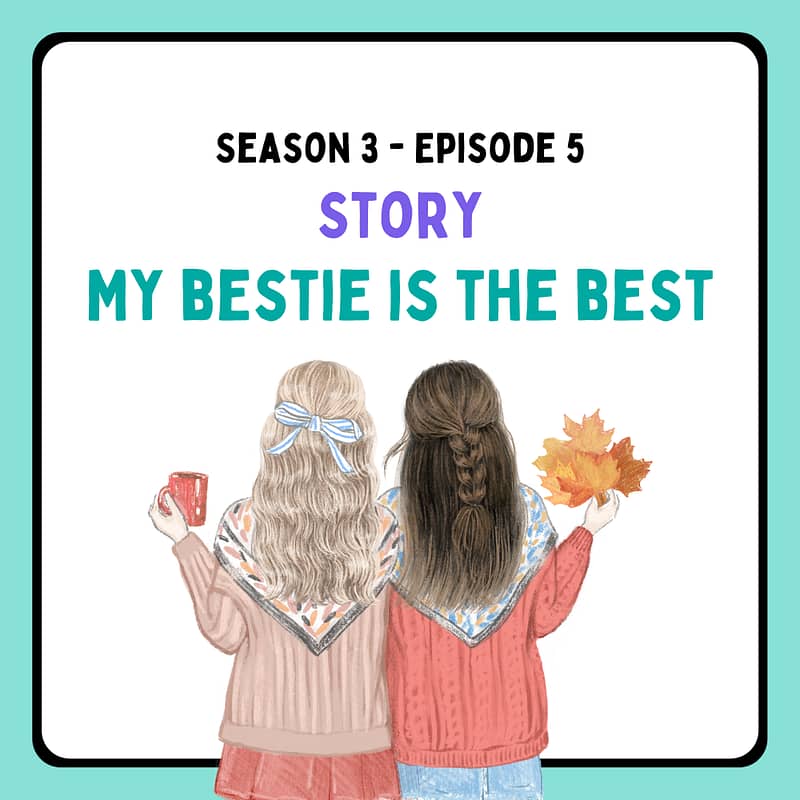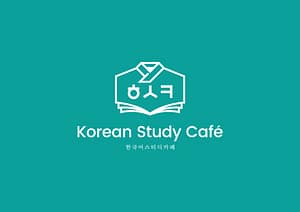Powered by RedCircle
시즌3, 5화. 이야기편 | 내 절친이 최고예요.
Season 3, Episode 5 – Story | My bestie is the best.
안녕하세요? 잘 지냈어요? It’s your host of the Korean study café, Vanessa.
Today we will listen to a story about a best friend.
Then now, shall we listen to the story?
저는 제일 친한 친구 한 명이 있어요. 그 친구 이름은 박정연이에요. 저는 고등학교 때 부터 정연이하고 친했어요. 처음에 그 친구는 아주 외향적이고 저는 내향적이었어요. 그래서 그 때는 서로 별로 안 친했어요.
I have a best friend, and her name is Park Jeong-Yeon. I have been close to Jeong-Yeon since high school. At first, she(Jeong-Yeon) was very extroverted, and I was introverted. So we weren’t close to each other at that time.
그런데 어느 날 우리 학교에서 수학여행을 다 같이 갔어요. 그 때 우연히 정연이와 같은 방을 썼어요. 그 수학여행에서 우리는 서로 많이 도와주고 깊은 대화를 할 수 있었어요. 그렇게 우리는 절친이 되었어요.
But one day, all of us in our school went on a school trip altogether. At that time, I used the same room with her(Jeong-Yeon) coincidentally. We helped each other a lot on that school trip and were able to have a deep conversation. That’s how we’ve become best friends.
지금도 정연이랑 자주 만나요. 우리는 만나면 서로의 가족, 직장, 남자친구 이야기 등을 해요. 정연이하고 대화하면 너무 즐거워요. 저는 이 친구에게 저에 대한 모든 이야기를 할 수 있어요. 저는 이 친구를 많이 좋아하고 신뢰해요. 앞으로도 우리 우정이 오래가면 좋겠어요. 여러분은 친한 친구가 있어요? 그 친구에 대해서 설명해주세요.
Even now, we still meet often. When we meet each other, we talk about various subjects such as family, work, boyfriend, and more. It’s pleasing when I speak with her. I can tell her or share everything about me. I genuinely like and trust her. I hope that our friendship lasts long in the future as well. Do you guys have a best friend? Please tell me about that friend.
How was it? Were you able to understand the story? Even if you didn’t, it’s fine because we will see the meaning together now.
Then, let’s check out some useful vocabulary and expressions.
저는 제일 친한 친구 한 명이 있어요. 그 친구 이름은 박정연이에요. 저는 고등학교 때 부터 정연이하고 친했어요. 처음에 그 친구는 아주 외향적이고 저는 내향적이었어요. 그래서 그 때는 서로 별로 안 친했어요.
Like any other language, there are many different ways to say “friend 친구” in Korean, depending on the type of relationship. So let’s learn synonyms of the word “friend 친구” in Korean.
제일 친한 친구 / 가장 친한 친구 (절친, 찐친, 베프) | best friend | 제일 친한 친구 or 가장 친한 친구 is the standard way to say best friend in Korean, whereas 절친, 찐친, 베프 are compound word that is usually used among young people
동무 | companion, friend | In South Korea, this word alone is not often used. It’s usually used with another word in a combined form. On the other hand, in North Korea, this word is very commonly used. If you watched the Korean drama “Crash landing on you,” you probably have heard this word.
소꿉친구 | childhood friend | 소꿉놀이 is one of the typical games that is played among Korean children. So 소꿉친구 means that a friend you know of from when you played 소꿉놀이.
길동무 | fellow traveler | It means the person who goes on the same road as you do. 길 means “road, street.” So it literally means “road friend.”
말동무 | companion to talk with | It means the person you can talk with. 말 means verbal talk. So 말동무 literally means speaking friend.
동료 | co-worker, colleague | The person who works together in a workplace
동지 | comrade, like-minded person | The person who has the same purpose or value.
전우 | fellow soldier | The person who fought together in a battle or lives together in a military
There are many friend-related words in Korean, right? If you try to memorize them all together, it’d be much easier to memorize them. So when you try to memorize vocabulary, try to memorize it with synonyms or antonyms. It’d be much easier and more effective.
All right, then, now let’s see the main terminology used in this paragraph.
고등학교 high school
친하다 to be close to (someone)
외향적이다 to be extroverted
내향적이다 to be introverted
그런데 어느 날 우리 학교에서 수학여행을 다 같이 갔어요. 그 때 우연히 정연이와 같은 방을 썼어요. 그 수학여행에서 우리는 서로 많이 도와주고 깊은 대화를 할 수 있었어요. 그렇게 우리는 절친이 되었어요.
By the way, do you know what 수학여행 is? It’s a school field trip as one of the educational curricula in the Korean education system. The objective is to get students to experience the wonderful nature and different cultures to broaden their knowledge and perspectives. But unlike field trips in the US or other countries, the trip occurs in Spring or Autumn, and it usually lasts three to four days, or even it can last up to a week. In the past, schools usually went on this trip within Korea. However, some schools have recently gone abroad to neighboring countries like Japan, China, South-Eastern Asian countries, or even go far as Europe.
When you take part in the field trip, you spend 24 hours with your friends and teachers. Therefore, it can be a really great chance to get to know each other even more deeply and have a better relationship. Hence, the speaker was able to make a new friend by making an honest and genuine conversation. All right, now that we know what 수학여행 is, we can understand how they got closer to each other.
Then now, let’s check out the terminology used in this paragraph.
우연히 by chance, coincidently
쓰다 to use, it also has another meaning “to write”
도와주다 to help (someone)
깊은 대화 deep conversation
지금도 정연이랑 자주 만나요. 우리는 만나면 서로의 가족, 직장, 남자친구 이야기 등을 해요. 정연이하고 대화하면 너무 즐거워요. 저는 이 친구에게 저에 대한 모든 이야기를 할 수 있어요. 저는 이 친구를 많이 좋아하고 신뢰해요. 앞으로도 우리 우정이 오래가면 좋겠어요.
여러분은 친한 친구가 있어요? 그 친구에 대해서 설명해주세요.
In this part, let’s check out how we can say a useful sentence pattern “I hope that -.”
면 좋겠어요 is the way to say “I hope that -“
Before the syllable 면, you have to attach a verb in a conjugated form. If the verb stem ends with a vowel or ㄹ, then just add 면. On the contrary, if the verb stem ends with a final consonate 받침, then add 으면. There are some irregular verbs in this rule, so if you want to check it out, go to our website koreanstudycafe.com and see it.
가다(to go) – 가면 좋겠어요
먹다(to eat) – 먹으면 좋겠어요
살다(to live) – 살면 좋겠어요
듣다(to listen) – 들으면 좋겠어요*
돕다(to help) – 도우면 좋겠어요*
낫다(to be/get better) – 나으면 좋겠어요*
하얗다(to be white) – 하야면 좋겠어요*
* irregular verbs
Now, to understand this concept better, let’s hear some examples sentences.
내일 날씨가 좋으면 좋겠어요. I hope that the weather tomorrow is good
내일 모레 수학 시험이 안 어려우면 좋겠어요. I hope that the math exam the day after tomorrow is not difficult
제가 지금보다 한국어를 더 잘 하면 좋겠어요. I hope that I can speak Korean better than now
Lastly, let’s see the main vocabularies that are used in this part
즐겁다 to be pleased, pleasant, enjoyable, joyful, happy
신뢰하다 to trust
우정 friendship
오래가다 to last long




